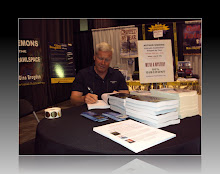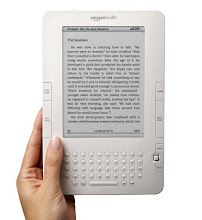Tuesday, July 27, 2010
Meet The Editor

JW: Today my guest is Adele Brinkley, a professional editor who can edit anyone’s work ranging from letters to novels and short stories. Good morning, Adele!
Adele: Morning, John. Thank you for an opportunity to promote my editing service, With Pen In Hand.
JW: Tell us a little bit about your background and qualifications to be an editor.
Adele: I’ve been a professional editor for nine years and a high school English teacher for nearly 30. Editing comes as naturally to me as shouting Amen during a southern Baptist tent meeting. I truly try not to walk around with a red pen in my hand, but so far I have failed.
I want my clients’ works to be the best they can be. If they look good, then I look good. It’s a financial ego trip!
I’ve edited papers in all genres from practically every state in the Union. I actually have a couple of clients overseas, one in Sierra Leone.
Also for your Atlanta/Georgia area readers, please note that I am a local editor, located just south of Atlanta in the shadows of the Atlanta Motor Speedway.
Please go to my web page (www.WithPenInHand) to “meet” me and review my credentials.
JW: Do people most often employ you for manuscripts and query letters, or is there a broad range of services requested?
Adele: I do edit a broad range of materials, but manuscripts (fiction and non) and dissertations make up the majority of my work. What I have found with the latter is that doctoral candidates do know their material, but most of them do not know the fine points of grammar that APA requires.
I have edited some wonderful manuscripts. There are so many good writers out there who spin wonderful tales. They have not yet reached the level of Anne Rice, John Grisham, or Agatha Christie, but they produce some awesome books. I hope to see them one day on best seller lists.
I also have several clients who pay me a yearly fee to edit their business letters, journal entries, notes, or whatever they need.
JW: Since much of my network consists of writers of prose, short stories and novels, tell us about your fee and approximate length of time between submission and completion.
Adele: My fee is quite reasonable, especially compared to the fees of editors with major publishers or editing companies. I am strictly a freelancer. The cost for an initial novel of any length is $1.00 per double spaced page in 12 pt. font size and Times Roman font. Because I am not editing works of authors such as Rice or Grisham, I cannot charge exorbitant fees.
I had an author tell me one time that he regretted that he could not use my service because I didn’t charge enough. No problem, I’ll raise the price if people feel more comfortable with a higher fee. I wrote to him that he would get the same quality of editing for $1.00 a page that he would get if I charged him $15 a page. Several weeks later, he contacted me again, saying he had reconsidered. After checking out the “big guys,” I looked good to him!
JW: Adele, in editing novels or short stories, is there any one item that stands out as the most common mistake made by authors?
Adele: Verb tense, verb tense, and verb tense! After that come misplaced modifiers and/or dangling participles, word choices, repetition of words or phrases, and the usual culprits: subject-verb agreement, punctuation (especially with quotes and attributions), switching the POV, etc., etc, etc.
JW: During your career, have you had any published work(s) yourself?
Adele: No manuscripts. I can’t sustain a thought that long. I wrote for a newspaper for 15 years and had hundreds of stories and columns published, some of which were recognized and rewarded by the GA Press Association. The wire services even picked up several of them.
JW: What’s the best way to get in touch with you to discuss a proposal of any type?
Adele: On my web page at www.WithPenInHand.net , your readers will find a contact link. Click on it, and we’re in business!
JW: Thank you for an informative interview, Adele. I know my readers are always looking for reliable, professional people who can help them polish their work. It has been a pleasure.
Thursday, July 22, 2010
Does Size Really Matter?

Regarding the length of paragraphs--size, or perhaps better stated, length, is entirely up to the individual author. Many of us like to write the way we enjoy reading. Personally, I like short chapters, particularly when I know I don't have a huge block of time to read. I can get several chapters read and not have to stop in the middle of a scene.
Tuesday, July 20, 2010
First Person Point of View

I write reviews for the New York Journal of Books, Two of the last three books I've reviewed were written in first person POV. They were good; the writer was able to get the reader inside the protagonist's head much better than if they had used third person.
Saturday, July 17, 2010
Tuesday, July 13, 2010
Top 10 Writing Tips

1. Write the sentence, not just the story
Long ago I got a rejection from the editor of the Santa Monica Review, Jim Krusoe. It said: “Good enough story, but what’s unique about your sentences?” That was the best advice I ever got. Learn to look at your sentences, play with them, make sure there’s music, lots of edges and corners to the sounds. Read your work aloud. Read poetry aloud and try to heighten in every way your sensitivity to the sound and rhythm and shape of sentences. The music of words. I like Dylan Thomas best for this–the Ballad of the Long-Legged Bait. I also like Sexton, Eliot, and Brodsky for the poets and Durrell and Les Plesko for prose. A terrific exercise is to take a paragraph of someone’s writing who has a really strong style, and using their structure, substitute your own words for theirs, and see how they achieved their effects.
2. Pick a better verb
Most people use twenty verbs to describe everything from a run in their stocking to the explosion of an atomic bomb. You know the ones: Was, did, had, made, went, looked… One-size-fits-all looks like crap on anyone. Sew yourself a custom made suit. Pick a better verb. Challenge all those verbs to really lift some weight for you.
3. Kill the cliché.
4. Variety is the key.
5. Explore sentences using dependent clauses.
A dependent clause (a sentence fragment set off by commas, dontcha know) helps you explore your story by moving you deeper into the sentence. It allows you to stop and think harder about what you’ve already written. Often the story you’re looking for is inside the sentence. The dependent clause helps you uncover it.
6. Use the landscape.
Always tell us where we are. And don’t just tell us where something is, make it pay off. Use description of landscape to help you establish the emotional tone of the scene. Keep notes of how other authors establish mood and foreshadow events by describing the world around the character. Look at the openings of Fitzgerald stories, and Graham Greene, they’re great at this.
7. Smarten up your protagonist.
Your protagonist is your reader’s portal into the story. The more observant he or she can be, the more vivid will be the world you’re creating. They don’t have to be super-educated, they just have to be mentally active. Keep them looking, thinking, wondering, remembering.
8. Learn to write dialogue.
9. Write in scenes.
What is a scene? a) A scene starts and ends in one place at one time (the Aristotelian unities of time and place–this stuff goes waaaayyyy back). b) A scene starts in one place emotionally and ends in another place emotionally. Starts angry, ends embarrassed. Starts lovestruck, ends disgusted. c) Something happens in a scene, whereby the character cannot go back to the way things were before. Make sure to finish a scene before you go on to the next. Make something happen.
10. Torture your protagonist.
The writer is both a sadist and a masochist. We create people we love, and then we torture them. The more we love them, and the more cleverly we torture them along the lines of their greatest vulnerability and fear, the better the story. Sometimes we try to protect them from getting booboos that are too big. Don’t. This is your protagonist, not your kid.
Monday, July 12, 2010
American Short Fiction

Thursday, July 8, 2010
Borders Finally In

Tuesday, July 6, 2010
Query Letters, The Worst Mistakes

- The salutation reads, "Dear Sir," when the publisher is a woman.
- Crazy, non-traditional fonts, all caps, and underlining.
- Getting personal is big. If you've met them or spoken on the phone with them, remind them of that.
- It's okay to say, "I've written about a social issue," etc.
- Stay within the publisher's genre.
- Be professional.
- Have a clear, concise summary of what the book is about--don't ramble.
- Include the genre and word count. If you're not certain, check out books similar to yours at the book store--don't tell them yours doesn't fit into any established genre.
- If a manuscript is requested by mail, don't over-tape the box--it annoys publishers.
Monday, July 5, 2010
Sunday, July 4, 2010
Two New Book Reviews

Creating Suspense

ShareThis
Watch a book trailer for TARGETED!
Chicago Warriors Thriller Series
Watch a trailer for Gripped.
My Shelfari Bookshelf
Gift Store
SIBA Signing

TotalRecall at SIBA

